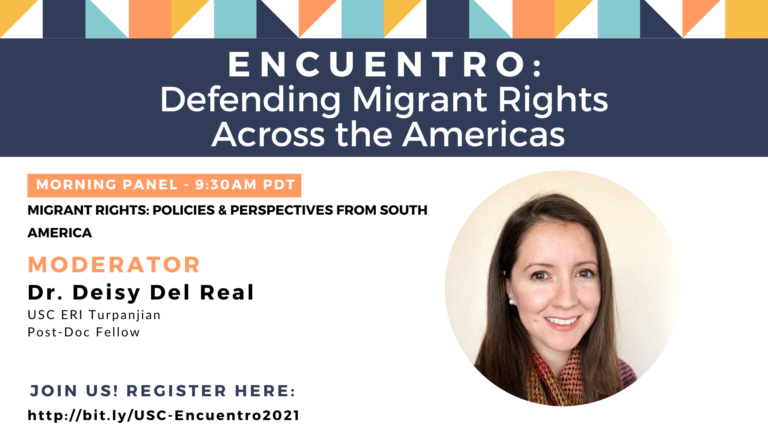
Migrant Legalization and Rights: Ideas and Strategies from South America
This post is part of a blog series featuring our global conference on April 13, 2021, “Encuentro: Defending Migrant Rights Across the Americas”
A hemispheric lens on the Americas reveals two contrasting approaches to immigration in the last 20 years. The United States has used punitive immigration policies and collaborated with Mexico to deter immigrants and Central American asylum seekers from entering its southern border. In sharp contrast, South American governments have created migration policies that expand migrants’ access to legal residency and rights. These include the Mercosur Residency Agreement and Argentina’s 2003 immigration law. These migration policies impact the lives of 11 million international migrants within South America in 2020.
This post provides an overview of key right-based migration policies and the contexts, strategies, and ideas that secured their passage. I draw on an analysis of organizational archives and 320 in-depth interviews with immigrants, activists, experts, and state officials involved in migratory policy making and implementation in South America.
“El Mercado Común del Sur” (Mercosur) has been a key place of migration policy innovation. Mercosur is a regional trade agreement with an intergovernmental organization that seeks to integrate the South American states socially, economically, and politically. Governments send representatives to design policies on migrant admissions and integration, which have expanded migrants’ access to legal residency and rights.
Some policy arenas allow representatives of civil society to form part of negotiations. Within Mercosur’s Social-Labor Subgroup, labor representatives successfully pushed business leaders and state representatives to pass the Social-Labor Declaration (1998). This non-binding Declaration promotes equal rights between citizens and non-citizen workers within Mercosur’s affiliated states. The logic underpinning the Declaration is that immigrant rights and legalization are necessary; keeping people in an undocumented condition diminishes all workers’ working conditions and safety protections.
At Mercosur’s Specialized Migration Forum, immigration authorities from various countries regularly meet to resolve migratory issues with regional policies. Building on the 1998 Social-Labor Declaration, Argentine, Brazilian, Bolivian, Chilean, Paraguayan, and Uruguayan state representatives to the Specialized Migration Forum passed the Mercosur Residency Agreement (2002). This migration treaty makes legal status a substantive right and gives migrants the same social, economic, and cultural rights as citizens. The Agreement allows migrants who are nationals of countries affiliated with Mercosur and who have a clean criminal record in the last five years to access legal residency with a pathway to citizenship.
The Residency Agreement disentangles migrant legalization from the neoliberal logic or the popular idea in the United States that immigrants seeking lawful presence must first prove they are self-reliant and will not become a burden on the state. Qualifying migrants can acquire legal residency without having to provide proof of their employment or economic solvency. The Mercosur Residency Agreement is more inclusionary than the European Union’s residency provisions, which require European migrants to provide proof of employment or sufficient income. The Agreement is eradicating undocumented immigration within South America. Between 2006 and 2016, 2.7 million undocumented immigrants have obtained legal residency status through the Agreement’s visa categories.
The success of the Agreement is the result of pro-immigrant state bureaucrats and activists, economic and political crises, the emergence of left-wing governments, and mass emigration. During the 1990s, right-wing governments in South America implemented neoliberal programs (i.e., government spending reductions, privatization, and deregulation), which caused economic crises. At the turn of the millennium, social movements erupted against right-wing political parties that favored neoliberal approaches and displaced several presidents. Amid political and economic crises, pro-immigrant state bureaucrats from Brazil, Argentina, and Uruguay gained autonomy to design and sign the Residency Agreement within Mercosur in 2002.
Soon after, left-wing governments rose to power throughout South America. They ratified the Residency Agreement and supported rights-based immigration bills as part of their platforms to expand social and human rights protections.
Immigrant and human rights advocates expanded these efforts. They successfully pushed for the passage of rights-based immigration laws in Argentina (Law N° 25.871 of 2003), Uruguay (Law N° 18.250 of 2008), Bolivia (Supreme Regulatory Decree N° 1923 of 2014), and Brazil (Law N °13.445 of 2017). These laws promote immigrants’ legality and rights. For example, the Argentina and Uruguayan laws make migration a human right. Additionally, the new immigration laws do not criminalize undocumented immigration. According to the law, state officials who identify undocumented people should not detain or deport them. Instead, officials have to give them information and time to acquire legal residency. Uruguay has gone as far as providing immigrants from all over the world legal permanent residency within months after their arrival.
Between 2002 and 2015, immigration restrictionist models, such as those from the United States, were discarded as dysfunctional and inhumane. The South American economic crisis prompted millions of South Americans to emigrate to the United States and Europe in search of employment opportunities. Many who emigrated experienced discrimination and were deported and shared these experiences with relatives who stayed behind. Drawing on the experiences of co-nationals, the South American officials and activists presented rights-based migration policies as the most pragmatic and morally correct approach to migration management. If immigration restrictions did not stop undocumented immigration, it was better to legalize all immigrants and integrate them into the host society.
As conservative governments gained power in the last six years, many have continued to use the rights-based and legalization approaches to migration to address the Venezuelan exodus. Over 80% of the 5.5 million Venezuelans who fled the country moved to other South American countries. Conservative officials coordinate efforts at regional meetings of The Lima Group and The Quito Process. Some governments (e.g., in Argentina, Uruguay, and Brazil) have extended the Mercosur Residency Agreement benefits to Venezuelans to facilitate their legalization. Other South American governments prefer more flexible approaches and use ad hoc and temporary legalization programs to manage the inflow of Venezuelan migrants and refugees.
The right-wing governments have supported Venezuelan migrants as part of their foreign policy stance against socialism and the Venezuelan President Nicolás Maduro. Governments in the Global North and international organizations have supported these conservative governmental efforts with aid and technical support.
However, anti-immigrant governments use decrees and administrative action to undermine the good aspects of the immigration laws. For example, Argentine President Mauricio Macri (2015-2019) used a decree to increase the deportations of Bolivian, Peruvian, and Colombian migrants. Brazilian President Jair Bolsonaro (2019-present) and his administration use a restrictive implementation protocol that does not match the rights-based immigration law of 2017.
Despite these caveats, the South American governments have successfully implemented migration policies that promote migrant legality and rights for almost twenty years. As my colleague Douglas Massey will show, immigration restrictions do not prevent undocumented immigration and inflict unnecessary harm on vulnerable populations. Learning from South America, we can identify ideas and strategies to create a North American approach to migration management that centers on migrants’ legality and right to a dignified life.
About the author:
Dr. Deisy Del Real completed her Ph.D. in sociology at the University of California, Los Angeles (UCLA) in 2019. She is the Turpanjian postdoctoral fellow and forthcoming assistant professor of sociology at the USC. Her research broadly examines the social construction of legal immigration systems and how legal immigration contexts, which range from enforcement- to rights-focused, affect immigrants’ lives. Her research lies at the intersection of political sociology, international migration, the sociology of law, medical sociology, comparative-historical sociology, and race and ethnicity.
One study examines how the United States’ restrictive immigration laws affect the lives of undocumented and U.S. born young adults who grew up with undocumented parents. Her article “Toxic Ties: The Reproduction of Legal Violence within Mixed-Status Intimate Partners, Relatives, and Friends,” in International Migration Review won the ASA Sociology of Law Graduate Student Award and received an honorable mention from the ASA International Migration section. Another publication, “They See Us like Trash”: The Impact of Mexican Illegality Stigma on the Psychological Well-Being of Undocumented Young Adults,’ is published in Advances in Medical Sociology.
Another line of research examines how rights-based immigration legal systems are created and affect immigrants. One study, “Documenting the Undocumented,” identifies how six South American governments designed, ratified, and implemented the Mercosur Residency Agreement, which is the first policy to immigrants’ legal residency status a substantive right. She is currently completing her book manuscript based on archives and 147 interviews with advocates and policymakers in South America. Moreover, a new project examines the implementation of the Mercosur Residency Agreement by comparing the legal residency acquisition experiences of Venezuelan immigrants and refugees who settled in Argentina, Colombia, and Chile.
Her research projects have been supported by the National Science Foundation (twice) among several other organizations. Further, Dr. Del Real regularly provides expert consultancy and runs workshops for governments, universities, and organizations. For instance, she provided expert testimony before Mercosur—a regional organization like the EU–during their adaptation of the Inter-American Human Rights Court’s Advisory-Opinion 21/14. This advisory opinion specifies how states should protect the human rights of undocumented children and adolescents. As a result of this collaboration, she provided further consultation to the Congress of San Jose, Uruguay, where they voted in favor of passing the Acta 11, which implements this advisory opinion. In 2018, she was awarded the UCLA Charles E. & Sue K. Young Graduate Award for her research and public sociology. This is the highest honor given to one graduate student in social sciences by the UCLA College Deans for exemplary academic achievement, research, and service to the campus and community.

© 2021. This work is licensed under a CC BY-NC-ND 4.0 license.